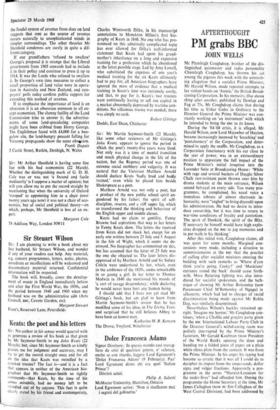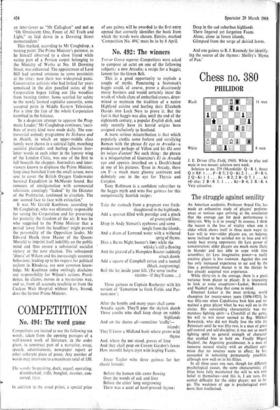PM grabs BBC
AFTERTHOUGHT
JOHN WELLS
Mr Plumleigh Coughdrop, brother of the dis- tinguished quizmaster and radio personality Chumleigh Coughdrop, has thrown his cat among the pigeons this week with the astonish- ing allegation that a socialist Prime Minister, Mr Harold Wilson, made repeated attempts to lay violent hands on 'Auntie,' the British Brold- casting Corporation. In his memoirs, One damn thing after another, published by Dewlap and Fag at 75s, Mr Coughdrop claims that during his time as Usher Gules in Ordinary to the Director General the Prime Minister was con- stantly working on 'an instrument' with which he intended to bring the BBC to its knees.
During the '64-'68 crisis, it is alleged, Mr Harold Wilson, now Lord Micawber of Huyton, became increasingly incensed by 'knocking' and 'pantaloonery' at the Corporation, and deter- mined.to apply the snaffle. Mr Coughdrop, as a Corporation functionary with his ear close to the seat of power, was in an extraordinary position to appreciate the full impact of the Prime Minister's initial irruption into the Lavender Suite at Broadcasting House: 'White with rage and several buckets of Dayglo Silver Chalk rust-resistant paint thrown over him by drama students at the main entrance, Wilson sensed betrayal on every side. Too many pro- grammes, he complained, his nasal voice a tremulous vibrato of almost electronic in- humanity, were "angled" to bring discredit upon his administration. He had no desire to intro- duce censorship, but it was time to return to war-time conditions of loyalty and patriotism. The spirit of Dunkirk, the spirit of the Blitz. If necessary he himself would have high explo- sives dropped on the BBC to jog memories and to put teeth in his thinking.'
After this initial visit, Coughdrop claims, all was quiet for some months. Marginal con- cessions were made, including a directive to commissionaires at the BBC that the practice of calling after socialist ministers entering the building with such remarks as 'Where d'you think you're going, Cocky?' and 'Musicians' entrance round the back' should cease forth- with. More flattering lighting was also intro- duced for socialist spokesmen, and the tech- nique of showing Mr Arthur Bottomley (now Paramount Chief M'Bottomley of Ngugu) in silhouette, which had led to charges of racial discrimination being made against Mr Robin Day, was similarly discontinued.
Nevertheless Wilson's hackles remained up- right. 'Imagine my horror,' Mr Coughdrop con- tinues, 'when a Chablis and gruyere party given by the Bac International Labour Party Club in the Director General's withdrawing room was politely interrupted by the Prime Minister's factotum, Mr Gerald Kaufman (now President of the World Bank), opening the door and handing me a folded piece of paper on a plain white china plate from the canteen. It was from the Prime Minister. In his anger his typing had become so erratic that it was all I could do to decipher its import from the ampersands, dollar signs and vulgar fractions. Apparently a pro- gramme in the series "Marxist-Leninism for the under-fives" had offended him. During the programme the Home Secretary at the time, Mr James Callaghan (now Pc Jim Callaghan of the West Central Division), had been addressed by
an interviewer as "Mr Callaghan" and not as "Oh Omniscient One, Fount of All Truth and Light," as laid down in a Downing Street memorandum.'
This marked, according to Mr Coughdrop, a turning point. The Prime Minister's patience, as he himself observed to a close friend while eating part of a Persian carpet belonging to the Ministry of Works at No. 10 Downing Street, was exhausted. The appointment of Lord Hill had seemed ominous to some pessimists at the time: now there was widespread panic. Conservative activists who had lurked for years unnoticed in the dim panelled suites of the Corporation began falling out like woodlice from burning timber. Some scuttled for safety to the newly formed capitalist consortia, some accepted posts in Middle Eastern Television. For a time the fate of the whole Corporation trembled in the balance.
'In a desperate attempt to appease the Prag- matic Leader,' Mr Coughdrop continues, 'sacri- fices of every kind were made daily. The con- troversial comedy programme In Sickness and in Health, in which an upper-middle class family were shown in a satirical light, mouthing socialist platitudes and hurling abusive four- letter words at each other in the leprosy wing of the London Clinic, was one of the first to fall beneath the chopper. Journalists and inter- viewers known to displease the Prime Minister, long since banished from the small screen, were sent to cover the British Oxygen Underwater Survival Expedition in McMurdo Sound. But rumours of amalgamation with commercial television, cunningly "leaked" by the Dictator of the Proletariat, continued to circulate. The BBC seemed face to face with extinction.'
It was Mr Gerald Kaufman, according to Mr Coughdrop, who was ultimately responsible for saving the Corporation and for preserving for posterity the freedom of the air. It was he who suggested to the Prime Minister that a period 'away from the headlines' might permit the personality of the Opposition leader, Mr Edward Heath (now Master of the Queens Musick) to imprint itself indelibly on the public mind and thus ensure a substantial socialist victory at the next election. The subsequent 'illness' of Wilson and his increasingly eccentric behaviour, leading up to his request for political asylum in Rhodesia, are now common know- ledge. Mr Kaufman today smilingly disclaims any responsibility for Wilson's actions. Provi- dence, he claims, moves in a mysterious way, and so, from all accounts reaching us from the Cuckoo Weir Hospital without Bars, Strood, does the former Prime Minister.







































 Previous page
Previous page